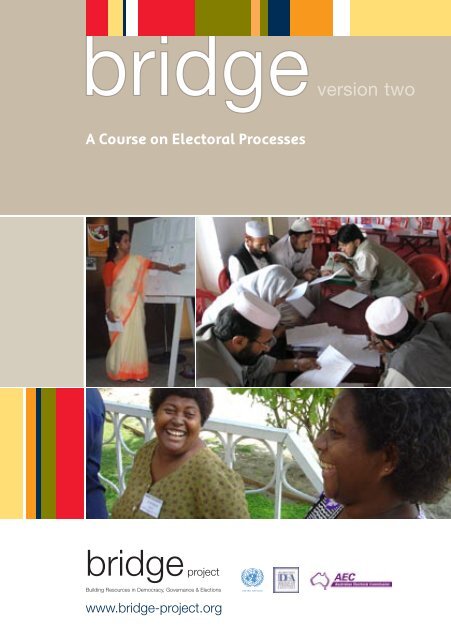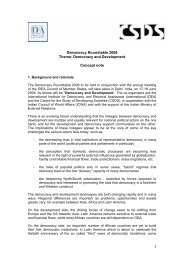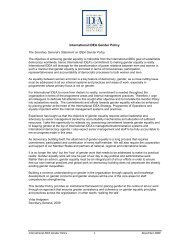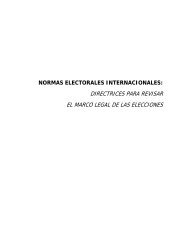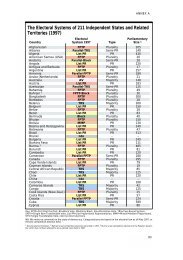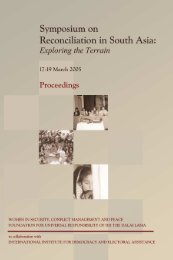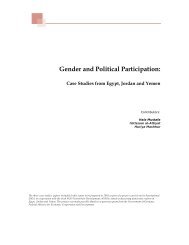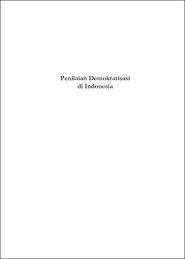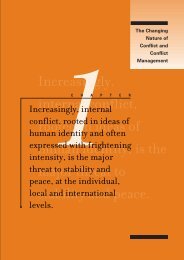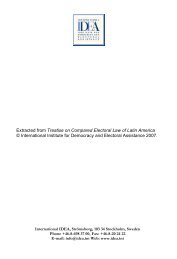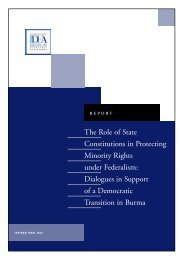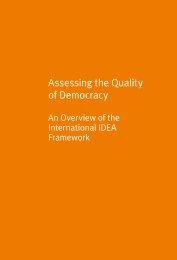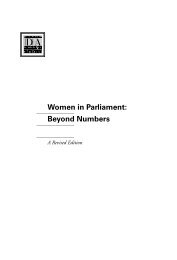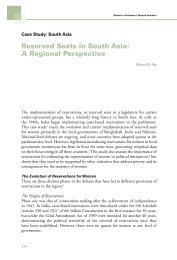BRIDGE Brochure - International IDEA
BRIDGE Brochure - International IDEA
BRIDGE Brochure - International IDEA
You also want an ePaper? Increase the reach of your titles
YUMPU automatically turns print PDFs into web optimized ePapers that Google loves.
A Course on Electoral Processes<br />
bridge project<br />
Building Resources in Democracy, Governance & Elections<br />
www.bridge-project.org
Background & History of <strong>BRIDGE</strong><br />
The past 15 years has seen a rapid increase in the number of democratic states. As a result, the<br />
number of elections worldwide has increased dramatically. Capable and professional election<br />
administrators are essential for organising elections, and without the right skills in place election<br />
processes can be undermined. To achieve effective, sustainable electoral administrations, the<br />
development of the capacity of their staff needs to be prioritised. To date, there have been<br />
few formal opportunities available for comprehensive professional development in election<br />
administration.<br />
In response to this, the <strong>International</strong> Institute of Democracy and Electoral Assistance (<strong>IDEA</strong>),<br />
the Australian Electoral Commission (AEC) and the United Nations Election Assistance Division<br />
(UNEAD) have developed the <strong>BRIDGE</strong> Project (<strong>BRIDGE</strong> stands for Building Resources in<br />
Democracy, Governance and Elections). While the focus is still on elections it aims to put<br />
elections in context of governance and democracy.<br />
<strong>BRIDGE</strong> is the most comprehensive professional development course available in election<br />
administration. It has been developed by electoral administrators themselves, people with<br />
wide experience of elections in many different countries and contexts. It improves the skills,<br />
knowledge, and confidence both of election professionals and key stakeholders in the electoral<br />
process including members of the media, political parties, and electoral observers.<br />
Although users of Version 1 of the <strong>BRIDGE</strong> Project have found it to be an extremely useful tool,<br />
implementation of <strong>BRIDGE</strong> over the past five years has revealed the need for its expansion in<br />
order to keep <strong>BRIDGE</strong> up to date and to make it even more comprehensive<br />
<strong>BRIDGE</strong> Version 2 has been further internationalised by commissioning expert writers from as<br />
many cultural and language backgrounds as possible. We have writers from every continent and<br />
region - the Americas, Africa, Europe, Middle East, Asia Pacific and Australia and New Zealand.<br />
2 A Course on Electoral Processes
The aims of the <strong>BRIDGE</strong> Project are to<br />
• strengthen election administrators’ capacity to conduct their work in an effective and efficient<br />
manner<br />
• enhance electoral administrators professionalism<br />
• build teams and networksstrengthen election administrators’ capacity to conduct their<br />
work in an effective manner<br />
• build an understanding of the standards and principles, which underpin good electoral<br />
administration<br />
The <strong>BRIDGE</strong> Methodology<br />
• is not prescriptive. It encourages participants to develop creative and appropriate solutions<br />
to challenges<br />
• is flexible. The course has been developed in modules, and can be taught so as to cover all<br />
aspects of electoral administration, or to focus on specific elements of the electoral process<br />
• is adaptable to regional and cultural contexts. It can be modified to meet the specific<br />
needs of clients<br />
• is activity-based. There is very little traditional lecturing in the course. Participants are<br />
called on to play an active role in the course, the aim being to draw on their own skills and<br />
experiences<br />
• is practically focused. The course seeks to develop skills in areas which are important in an<br />
electoral administrator’s day-to-day work. It emphasises an understanding of the relationships<br />
between different tasks as a vital tool for meeting tight deadlines effectively<br />
• emphasises teamwork and network building. Participants get to know each other, and<br />
have the chance to build networks either within their own organisation, or between different<br />
organisations, countries and cultures<br />
• is global in scope and seeks to use comparative examples to illustrate options and<br />
best practice<br />
• uses content developed by electoral experts from around the world<br />
Building Resources in Democracy, Governance and Elections 3
Overview of <strong>BRIDGE</strong> Version 2 Modules<br />
<strong>BRIDGE</strong> Version 2 comprises 23 modules. These include 2 Foundation modules. These are an<br />
introduction to the standards and principles that underpin and the skills needed for effective<br />
electoral administration. Version 2 also contains 3 thematic groups: Electoral Architecture<br />
(5 modules), Working With Stakeholders (9 modules) and Electoral Operations (7 modules).<br />
<strong>BRIDGE</strong> Version 2 is due to be completed by the end of June, 2007.<br />
FOUNDATION MODULES<br />
Introduction to Electoral Administration<br />
Strategic & Financial Planning<br />
ELECTORAL<br />
ARCHITECTURE<br />
Legal Framework<br />
Boundary Delimitation<br />
Electoral Systems<br />
Electoral Management<br />
Design<br />
Electoral Technology<br />
WORKING WITH<br />
ELECTORAL<br />
STAKEHOLDERS<br />
Access to the Electoral<br />
Process<br />
Voter Information<br />
Electoral Contestants<br />
Electoral Observation<br />
Media & Elections<br />
Electoral Assistance<br />
Gender & Elections<br />
Electoral Dispute<br />
Resolution<br />
Civic Education<br />
ELECTORAL<br />
OPERATIONS<br />
Voter Registration<br />
Pre-election Activities<br />
Training of Electoral<br />
Officials<br />
Polling, Counting &<br />
Results<br />
Post-election Activities<br />
External Voting<br />
Security<br />
4 A Course on Electoral Processes
Capacity Development and Quality Assurance<br />
Training of Facilitators<br />
To ensure the highest possible quality of <strong>BRIDGE</strong> course delivery, the project partners only<br />
authorise fully accredited <strong>BRIDGE</strong> facilitators to conduct <strong>BRIDGE</strong> training courses.<br />
Accreditation as a <strong>BRIDGE</strong> facilitator requires potential facilitators to successfully complete<br />
the following:<br />
Step 1: A <strong>BRIDGE</strong> Train the Facilitator’s (TTF) Course. As part of the capacity development<br />
philosophy of <strong>BRIDGE</strong>, the Project partners conduct regular international TTF courses. Participants<br />
at a TTF are not only taught how to deliver the <strong>BRIDGE</strong> course, they are also exposed to generic<br />
training skills, writing skills, and adaptation skills that ensure that subsequent <strong>BRIDGE</strong> courses are<br />
tailor-made to their participants. For this reason, TTFs not only produce high quality <strong>BRIDGE</strong><br />
trainers, they also teach skills that any electoral management body will find useful in the<br />
development and implementation of operational training and voter education programs.<br />
Step 2: Co-facilitating a <strong>BRIDGE</strong> training session, supervised by a fully accredited <strong>BRIDGE</strong><br />
facilitator. This allows new <strong>BRIDGE</strong> facilitators to take a lead role in the planning and implementation<br />
of <strong>BRIDGE</strong> modules while being supported and mentored by experienced <strong>BRIDGE</strong> facilitators.<br />
It is only after successful completion of both of the above that one becomes a fully<br />
accredited <strong>BRIDGE</strong> facilitator<br />
Implementation Manual and Workshop<br />
To further enhance the quality of <strong>BRIDGE</strong> courses, the <strong>BRIDGE</strong> Project Partners have also<br />
developed a <strong>BRIDGE</strong> Implementation Manual and associated 3-day workshop in order to offer:<br />
Greater implementation guidance and support for organisations wanting to use and adapt<br />
<strong>BRIDGE</strong> material and courses and to assist implementers, project managers and facilitators<br />
(for different courses) to implement <strong>BRIDGE</strong> in the most effective way.<br />
<strong>BRIDGE</strong> courses to date<br />
Number of countries conducting <strong>BRIDGE</strong> module courses to date:<br />
Afghanistan, Angola, Armenia, Australia, Bangladesh, Bolivia, Burkina Faso, Democratic<br />
Republic of Congo, East Timor , Fiji, Georgia, Ghana, Indonesia, Jordan, Liberia,<br />
Mozambique, New Zealand, Palestine, Papua New Guinea, Solomon Islands, Sierra Leone,<br />
South Africa, Sweden, Vanuatu, Yemen<br />
People from the following countries have taken part in <strong>BRIDGE</strong> Courses:<br />
Afghanistan, American Samoa, Angola, Armenia, Australia, Azerbaïdjan, Bangladesh, Bénin,<br />
Bhutan, Bolivia, Botswana, Burkina Faso, Canada, Chad, Columbia, Congo (Brazzaville), Congo<br />
(DRC), Cook Islands, Costa Rica, Cote d’Ivore, East Timor, Egypt, Federated States of Micronesia,<br />
Fiji, Finland, France, Gambia, Georgia, Germany, Ghana, Guam, Haiti, Holland, India, Indonesia,<br />
Iran, Iraq, Ireland, Italy, Jamaica, Jordan, Kenya, Kiribati, Kosovo, Lebanon, Lesotho, Liberia,<br />
Malawi, Mali, Mauritius, Mexico, Morocco, Mozambique, Namibia, New Zealand, Nigeria, Niue,<br />
Palau, Palestine, Papua New Guinea, Portugal, Samoa, Saudi Arabia, Sénégal, Sierra Leone,<br />
Singapore, Solomon Islands, Somaliland, South Africa, Spain, Sri Lanka, Sudan, Swaziland,<br />
Sweden, Syria, Tanzania, Thailand, Tonga, Trinidad, Tuvalu, Uganda, Ukraine, United Kingdom,<br />
United States of America, Uruguay, Vanuatu, Yemen, Zambia, Zanzibar, Zimbabwe<br />
Building Resources in Democracy, Governance and Elections 5
Frequently Asked Questions and Answers<br />
Who is it for?<br />
<strong>BRIDGE</strong> is designed to give people new to the field of electoral administration a comprehensive<br />
introduction to their work, to offer experienced officials new insights into the principles underlying<br />
their tasks, and to inform those outside the field about the key challenges that arise in conducting<br />
elections. It aims to accelerate the learning of skills and knowledge of all participants, as well<br />
as to instil a commitment to ethical behaviour and professionalism. Other potential audiences<br />
include:<br />
• Electoral Commissioners<br />
• EMB Staff<br />
• Members of the Media<br />
• Political Parties<br />
• Parliamentarians<br />
• Security Forces<br />
• Civil Society Groups<br />
• Academics and University Students<br />
How do I participate in a course?<br />
Contact the <strong>BRIDGE</strong> Project Office (details on back page) who will be able to provide a list of<br />
upcoming courses (including modules, TTFs and Implementation workshops) or who can offer<br />
advice as to how to set up your own program<br />
What is the major source for <strong>BRIDGE</strong> materials?<br />
<strong>BRIDGE</strong> draws heavily on the ACE (Administration and Cost of Elections) Project and is<br />
designed to meet the needs of organisations that have embraced, or wish to embrace, modern<br />
management principles of diversity, equity, cross-cultural sensitivity, inclusiveness, and maximum<br />
use of the skills of all staff.<br />
Can <strong>BRIDGE</strong> materials be modified for a specific country?<br />
Experience has shown that <strong>BRIDGE</strong> courses are most effective when they are carefully tailored<br />
to the needs of participants; and this is best achieved by developing and delivering them in<br />
partnership with local bodies that can contribute to and/or drive the tailoring process.<br />
6 A Course on Electoral Processes
How can <strong>BRIDGE</strong> be used or modified?<br />
To date, <strong>BRIDGE</strong> has been used in the following ways. Modules have been taught essentially<br />
without any modifications (“Pure <strong>BRIDGE</strong>”). Specific activities have been extracted from the<br />
modules and incorporated into operational training (“A<strong>BRIDGE</strong>”). The resulting shortened<br />
and/or modified versions may mix <strong>BRIDGE</strong> modules and/or feature new tailored modules<br />
that use <strong>BRIDGE</strong> methodology. The contents from a number of different modules have been<br />
used to develop a short course to meet specific needs or to work within limited time frames<br />
(“HY<strong>BRIDGE</strong>”). Such a combination of <strong>BRIDGE</strong> methodology and contents with specific<br />
operational training aims at enhancing the client organisation’s own operational training activities.<br />
This can be done by inserting existing manuals, laws and regulations into the curriculum.<br />
Generic examples and principles may be used but only to introduce specific information.<br />
The activity-based methodology and elements of the curriculum have been used for exercises<br />
other than training (“Applied <strong>BRIDGE</strong>”). This type of <strong>BRIDGE</strong> may prove useful as an electoral<br />
assistance or dialogue tool. For example, in a country where boundary delimitation is a problem,<br />
Module 4 (Boundary delimitation) may serve as a possible way of reaching greater clarity and<br />
contributing to a solution. Other modules have also been used as a model for bringing electoral<br />
administrators together at a conference or meeting. These approaches can be tailored to enable<br />
the use of <strong>BRIDGE</strong> for local, national, regional or truly international audiences. Specialised<br />
courses can also be developed for particular target audiences, for example, administrators at<br />
a particular level of an organisation or specific stakeholders, such as political party functionaries.<br />
What is the basis for the teaching methodology of <strong>BRIDGE</strong>?<br />
Rather than relying heavily on traditional lecturing, <strong>BRIDGE</strong> is focused on practical issues and<br />
is activity-based, with each module offering a range of activities designed to convey clearly<br />
identified key understandings, and to achieve specified learning outcomes. <strong>BRIDGE</strong> uses a<br />
methodology based on adult learning principles, prioritising teamwork and experiential learning.<br />
It reflects the insight that people learn best when they take responsibility for their own learning,<br />
and are faced with material that is relevant to them and presented in a memorable and innovative<br />
way. Participants get to know each other and have the chance to build bridges within their own<br />
organisation, or between different organisations, countries and cultures.<br />
Do I have to pay to attend a course?<br />
To date no <strong>BRIDGE</strong> participant has been asked to pay tuition fees for attending a <strong>BRIDGE</strong><br />
course. However, funding for facilitators, materials, venue, travel, etc will have to be found by the<br />
host organisation.<br />
Building Resources in Democracy, Governance and Elections 7
Contacts:<br />
<strong>BRIDGE</strong> Project Office<br />
E: projectoffice@bridge-project.org<br />
Australian Electoral Commission<br />
<strong>International</strong> Services Section<br />
P: +61 3 9285 7114<br />
F: +61 3 9285 7117<br />
E: Ross.Attrill@aec.gov.au or<br />
Ben.Murray@aec.gov.au<br />
<strong>IDEA</strong><br />
Election Processes<br />
P: +46 8 698 3700<br />
F: +46 8 20 24 22<br />
E: info@idea.int<br />
United Nations Electoral<br />
Assistance Division<br />
P: +212 9632405<br />
F: +212 9632979<br />
E: ead@un.org<br />
<strong>BRIDGE</strong> is supported by a website which<br />
contains all of the <strong>BRIDGE</strong> curriculum and<br />
more detailed background information<br />
<strong>BRIDGE</strong> Project Website:<br />
www.bridge-project.org<br />
Produced Mar 2007<br />
bridge project<br />
Building Resources in Democracy, Governance & Elections<br />
www.bridge-project.org


